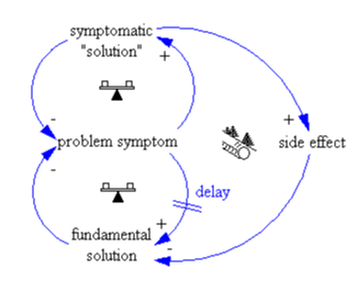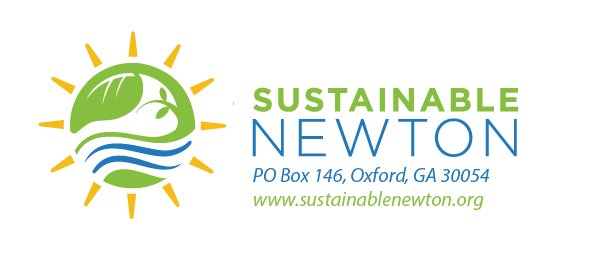|
By Maurice Carter, Sustainable Newton President
As the video shows, consumer product manufacturers have long played a complicit role in causing and exacerbating current woes. It's a perfect example of what Systems Thinking practitioners refer to as a "Shifting the Burden" scenario.
Systems Thinking is a technique pioneered in the mid 1950s to help organizations understand complex processes and solve systemic problems. In a "Shifting the Burden" scenario, we get into ever deeper trouble by reacting to the symptoms of a problem with short-term fixes (top circle in the diagram above) that don't address real root causes. We fail to invest adequately in the fundamental solutions (bottom circle) because these usually take longer to bear fruit (the delay). To make matters worse, quick fixes also delay or permanently prevent us from implementing fundamental solutions. (This undesirable long-term consequence is represented above by the "snowballing" side effect to the right.)
As the video shows, when it comes to plastic waste, we've seen the burden shifted over and over through the years to different stakeholders. Going back to the first half of the 20th Century, soft drink bottlers kept glass out of America's landfills by charging a deposit refunded when bottles were returned to the store. As a 1948 study showed, approximately 96% of all Coca Cola bottles were returned for a deposit under this system. But, as chronicled by The Intercept last month, Coca Cola and other companies changed course when plastic began replacing glass as the primary material for bottling. Plastics presented new problems. And, rather than investing to develop new technologies and processes to collect and recycle plastic bottles themselves, these manufacturers successfully shifted the burden to consumers and local governments by touting the virtues of recycling. And, they are generally determined to keep it that way. But, as plastics became increasingly pervasive in packaging of all types of products, consumers were overwhelmed by the demands of knowing what to recycle when, where, and how. They shifted that burden to local governments, who in turn shifted it again by asking recycling companies to simplify things. Those companies responded by developing "single-stream" recycling solutions to free consumers of the burden to sort and separate each material (plastic, glass, metal, paper, etc.). To the consumers, local governments, and trash haulers, it all seemed like magic. Technology advancing human well-being as it should. But, behind the scenes, new problems were emerging. That's what happens in a "shifting the burden" scenario. Manufacturers no longer had to worry about handling all that excessive plastic they were cranking out, so package designers became less and less concerned with downstream implications. And, since their curbside pick up took it all someplace with a magic machine, consumers felt no need to stop and think. So, they tossed it all into the blue bin on trash day. Local governments and trash haulers made the same assumptions. But, at the recycling facility, machinery was bogging down. Plastic bags not meant for the recycling bin were clogging sorting machines. Food waste on cardboard was gunking up the works. And, the wrong types of glass were breaking grinding machines. As the cost of handling single-stream recycling grew, the recycling companies did what everyone else was doing... They shifted the burden by finding countries like China where they could export America's solid waste and still receive enough revenue to make money on the process. For manufacturers, consumers, local governments, and the recycling companies, it was "out of sight, out of mind." But, what's too good to be true is just that: not true. And, when waste exported elsewhere started showing up in the world's oceans, dumped by less scrupulous companies, the gig was up. China and the rest of the world pushed back by rejecting our "recyclables." The recycling companies pushed back by raising rates dramatically and rejecting less profitable materials. Local governments and third-party haulers in turn pushed back by telling consumers they could no longer accept these materials. (Most recently, we've seen suppliers like the City of Covington stop accepting glass.) Meanwhile, manufacturers, retailers, consumers, local governments, trash haulers, and recycling companies have long since unlearned responsible behaviors we once followed for to take care of our waste. As is always true in a shifting the burden scenario, we've gotten sloppy, relied on quick fixes, and failed to develop sound, sustainable practices with positive long-term impacts. We can't fix that by shifting the burden, because that chain of effect has already shifted into reverse. The only place left to shift the burden now is by leaving the problem for our children to fix (or more likely, suffer from). And, we know we can't do that. (Besides, in case you haven't noted the climate marches and student strikes, our youth are pushing back too!) What we must do now is come to the table together, committed to understanding and fixing real problems at the most basic level with fundamental fixes. That means:
This is the kind of vision Sustainable Newton is committed to bringing to our community. We need you to join us.
0 Comments
Leave a Reply. |
Categories
All
Archives
February 2024
|
Photos from Chemist 4 U, shixart1985 (CC BY 2.0), Juhele_CZ, EarthLED, shixart1985, EcuaVoz, Chemist 4 U


 RSS Feed
RSS Feed
